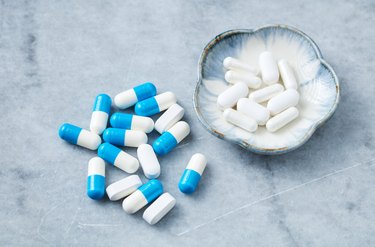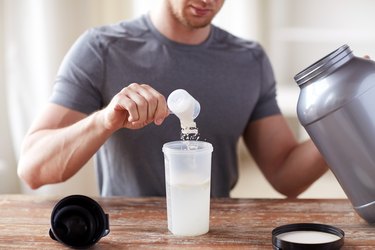
The dangers of creatine include kidney damage, weight gain and dehydration. Other side effects include, but are not limited to, diarrhea, nausea and seizures.
Tip
Experts believe creatine is safe for most people at recommended doses for short-term use. However, it has side effects, and its long-term safety isn’t known.
Video of the Day
What Is Creatine?
Creatine is an amino acid made in the liver, kidneys and pancreas. The body transforms it to phosphocreatine and stores it in the muscles to use as energy, according to the Mayo Clinic. Food sources include seafood and red meat, so vegetarians have lower levels of creatine in their body, notes the American Academy of Orthopaedic Surgeons.
Video of the Day
People take creatine to increase muscle mass and enhance athletic performance. It's also used in the treatment of creatine deficiency syndrome, which can manifested as congestive heart failure, diabetes, chronic obstructive pulmonary disease, depression, fibromyalgia and schizophrenia, according to U.S. National Library of Medicine.
Creatine is also used for remediation of muscular dystrophies and arthritis. Some people apply creatine to the skin to reduce signs of aging.
According to the U.S. National Library of Medicine, a creatine dosage of 25 grams per day for 14 days is likely safe. Smaller daily doses of 4 to 5 grams are also likely safe when taken for up to 18 months.
Possible Creatine Benefits
The Mayo Clinic reports that the body of research on creatine use for exercise shows mixed results. It might help athletes who need short bursts of energy, like weightlifters and sprinters.
In a February 2018 review article published in Sports Health, researchers reviewed investigations of creatine for athletics. Because of inconsistent findings, they concluded that its efficacy in sports performance is unknown.
Due to a lack of evidence that shows creatine as beneficial for congestive heart failure, the Mayo Clinic doesn't recommend it for this use. In rare cases of creatine metabolizing syndrome in children, supplements might improve some symptoms.
Preliminary research suggests topical application of creatine may help some skin conditions, the Mayo Clinic explains. Since studies on this use are so limited, it's too early to draw conclusions about its efficacy, according to the U.S. National Library of Medicine.
Adverse Creatine Effects
When taken at the recommended dosage for up to five years, creatine is generally considered safe, as per the Mayo Clinic. High doses could damage the kidneys, liver or heart. Anyone with a history of kidney disease shouldn't take this supplement. It may also worsen mania in people with bipolar disease.
Creatine causes muscles to retain more water, so taking supplements can result in weight gain due to increased water retention, notes the American Academy of Orthopaedic Surgeons. Other adverse effects of long-term use include nausea, diarrhea, muscle cramps, seizures and dehydration.
An irregular heartbeat is listed among the possible dangers and concerns associated with creatine, but more information is needed to verify it, states the U.S. National Library of Medicine.
Because doctors don't know the long-term health risks of creatine, especially for growing children, the supplements aren't recommended for anyone under 18 years of age, cautions the American Academy of Orthopaedic Surgeons. Women who are pregnant or nursing also shouldn't take creatine. Regardless of your age and health, always consult your doctor before starting the supplements.
Precautions When Taking Creatine
Since creatine causes the muscles to draw water from other parts of the body, drink more fluids when taking the supplement, advises the U.S. National Library of Medicine. In addition, don't exercise in the heat, because it can result in dehydration.
Taking creatine and caffeinated beverages, such as coffee, tea and soda, together may cause a stroke or worsening of Parkinson's disease. Don't take the supplement with ephedra, because it can result in a stroke or other serious consequences, says Michigan Medicine.
If you have signs of an allergy, such as hives, swelling or difficulty breathing, go to an emergency room, notes Michigan Medicine. Should you experience fluttering in your chest, a pounding heartbeat or trouble breathing, stop taking creatine and call your doctor.
Some medications, such as certain antibiotics like cyclosprine and gentamicin, can harm the kidneys. Non-steroidal anti-inflammatory drugs like ibuprofen and indomethacin can also harm the kidneys. The U.S. National Library of Medicine warns that taking creatine with these drugs increases the likelihood of kidney damage.
Was this article helpful?
150 Characters Max
0/150
Thank you for sharing!
Thank you for your feedback!


